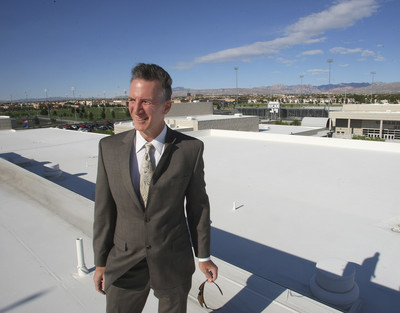Schools’ three R’s will add renewable
Public school officials squeezed between a tight economy and the growing demand for power are looking to the wind and sun for relief.
The Clark County School District has gotten approval from the state to contract with renewable energy providers to install solar panels or wind farms on the campuses of six high schools next year. The sites have not yet been selected.
"These systems may provide over half the power needed for the schools over a year," Associate Superintendent for Facilities Paul Gerner said. "It might run as high as three-quarters of the power needed."
Gerner said the renewable energy programs could result in savings of up to $200,000 during the first year of the pilot program.
The program does not require schools to buy or own the solar panels or wind turbines. Schools won't even have to pay for startup costs. Gerner said all the risk of ownership will remain with the renewable energy companies that choose to partner with the schools.
The schools would pay the companies for the wind or solar energy, but that cost is expected to be 10 percent to 15 percent less than what is now paid for electrical power.
"All of which is very helpful to us as the budget squeeze continues," Gerner said.
In addition to the fees paid by the schools, Gerner thinks that renewable energy providers will be attracted by other incentives. Federal tax breaks are available. Green-minded investors looking for a safe return will support the effort, Gerner said.
Renewable energy providers also will have the opportunity to sell "green tags" or renewable energy certificates, which are tradeable commodities. A green tag represents about 1 megawatt of power from a renewable energy source. The tags are bought by those in business and industry to offset greenhouse gas emissions.
Gerner said he won't be able to gauge interest in the idea until after June 5, which is the deadline for renewable energy providers to submit proposals to the district.
He is encouraged by the early response from industry groups.
"Some people are absolutely sure they can make money off this," Gerner said.
The effort may have other benefits as well, Gerner said, such as fueling students' imaginations.
"If kids can walk outside and see renewable power being generated by a system they can touch ... maybe it's going to provide the little bit of a spark to get some more engaged in why they should learn math or science or who knows what," Gerner said.
The community also could share in the benefits, since excess power will be diverted to the local power grid, he said. Because high schools are closed in the summer, the renewable energy collected at those sites could contribute power during peak demand times in Clark County. The participating schools would get a credit for the excess power produced.
Gerner emphasized that the renewable energy program hinges on community approval. The contract comes with a "neighborhood veto" clause, which requires the district to notify and seek approval from the surrounding community of potential sites. Wind turbines won't go up on campuses without the community's support.
Gerner said the public wouldn't be able to see the solar panels, which would be installed on rooftops.
John Hargrove, program manager for Nevada Power, said he liked the idea of eventually putting millions of square feet of school rooftops to good use.
"We've been very supportive," Hargrove said. "We've been at the table with them from the beginning."
Gerner had to work around certain utility regulations in designing the program. While schools will be generating their own power, neither the district nor its renewable energy providers would want to be regulated as a utility, Gerner said.
Hargrove said renewable energy providers would not qualify for tax incentives if they are considered utilities.
To circumvent regulatory barriers, the state now permits a third-party arrangement, whereby the schools would pay Nevada Power for the power generated by its renewable energy providers.
As another condition, the schools cannot become a net exporter of energy over the course of a year. The schools also would continue to buy some of its energy directly from Nevada Power.
"With as much as power as a high school consumes, that's not going to be a problem," Gerner said.
Contact reporter James Haug at jhaug @reviewjournal.com or 702-383-4686.

















